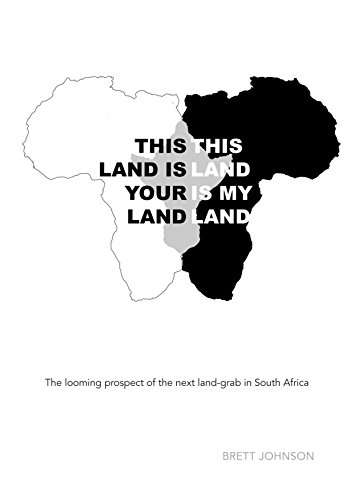This Land is Your Land, This Land is My Land: The Looming Prospect of the Next Land-Grab in South Africa.
By Brett Johnson
–Review by Vern Hyndman
I became virtually acquainted with Brett Johnson after reading his book “LEMON Leadership.” Brett currently lives in South Africa, after having lived in Silicon Valley for 30 years. During a conversation on the phone, Brett mentioned that he had a new book, “This Land is Your Land” about the issues in South Africa regarding land ownership and specifically the current issue of possible land expropriation.
Notwithstanding our friendship the topic made me cringe initially. What good could come of a white South African entrepreneur engaging an entire book about land in a culture still reeling from apartheid? I am a huge fan of Vusi Mahlasela, (https://youtu.be/LW0SMk-HJ3M) a South African singer otherwise known as “The Voice” and I wondered how my friend Brett would correlate to my hero Vusi? (consider Vusi’s TED talk as a soundtrack for this review!)
Brett veers straight into all the squeamish bits. He walks through the reality of the generations of injustice and murder folks endured because of the color of their skin. Brett pulls no punches and does not soft-pedal the horror. He talks about future issues expropriation inevitably causes. This Land explores the ditches unreservedly, and then offers ideas that are not only just, and Biblical, but are great politically and entrepreneurially. Brett talks about how physical enslavement has morphed into various methods of asset-based servitude.
As an entrepreneur, he explores the process by which people become capable of using assets to benefit the entire population.
The key to this book is in the tension between belief in Biblical private property rights, and the over-riding reality that God owns it all. This Land uses the Old Testament more than the New in this book, but with grace that surprised me. God’s purpose for assets is paramount.
This Land suggests that the way forward is not expropriation, which will lead to a transfer land ownership but not land stewardship, but rather cooperative ideas that offer a shared purpose to the entire country.
Brett uses the Bible and the Spirit of God in him skillfully in this book, and in the end, I could clearly see the hope that his ideas bring to reconciliation and a new flourishing reality for South Africa.
We would do well to pay close attention to Brett’s ideas and repurpose them for America.
Some favorite excerpts;
People have asked me, “Why did you leave Silicon Valley to come to South Africa?” One reason is that people in Africa are solving real problems, not making it easier to skip the queue at the popular restaurant or get your dry cleaning quicker. As someone said recently, we have the opportunity in developing nations to do something that makes our mom proud, not just do for us what mom used to do.1.
A study was done by a Harvard professor, Nikos Mourkogiannis, on how spending on Research & Development impacts innovation. The answer surprised him: not at all. Instead he found that the greatest driver of innovation is Purpose. Settling someone’s land claim without giving them a purpose (and simultaneously settling their identity) will not add value to the collective asset-base of the nation.2.
Doing more of what we did last year will not get us to a different tomorrow. Much of the emphasis in the land expropriation thinking seems to be on farms, for now. I am not a land expert by any means, but have kicked around a variety of ideas with those who are:
- Warehousing the farms of retiring farmers and refurbishing the back-office systems (under the guidance of seasoned farmers who have a heart to raise the next generations)
- Providing incentives to farmers approaching retirement to take in “learners” or apprentices and equip them to manage farms, thereby replicating themselves
- Shared land ownership
- “Stock options” where emerging owners share in the growth of cattle, sheep and other livestock
- High density farming in urban areas
- Using grow-lamp technologies to have a 24-hour growing time inside buildings and containers4.
As leaders there are times when we have to put the good of the whole above the needs of the individual. The paradox is this: God holds us accountable for the treatment of the individual as well. Giving away land is not the same as discipling people (teaching, training, growing, helping realize their full potential). When to put the individual above the whole the nation suffers; but when we violate the rights of the individual and fail to protect the most vulnerable—widows, orphans, foreigners—God holds us accountable.4.
This Land’s framework is more conservative than my own, and in a couple of places I earmarked a section for some future phone conversation with Brett, but somehow these differences mean nothing to the focus of the book.
I use the ideas from LEMON Leadership regularly, and I was surprised by the reframing “This Land Is Your Land” provided. This book has seeded new ideas and has created another “Oh, you too!” connection in which my friend Brett echoes the ideas that wake me up at night.
Brett Johnson http://inst.net/publications/
- Johnson, Brett. This Land is Your Land, This Land is My Land: The Looming Prospect of the Next Land-Grab in South Africa. Indaba Publishing. Kindle Edition. Location 742.
- Johnson, Location 869.
- Johnson, 887
- Johnson, 978

